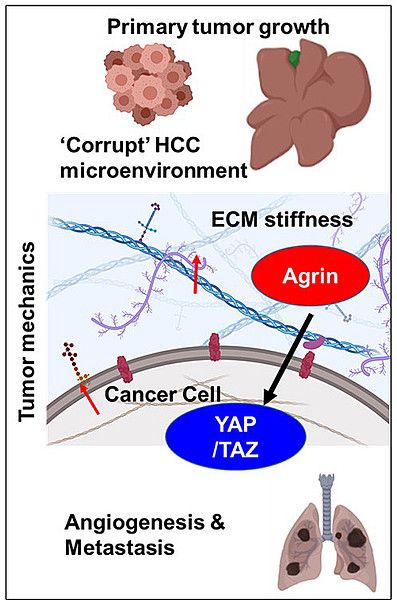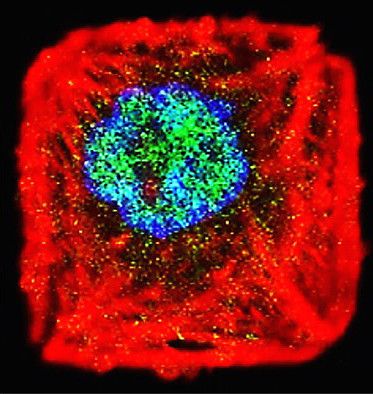As a translational expansion of our bench-side discoveries, we are exploring how Agrin could serve as a prognostic marker for cancers.
As a potential target for liver cancer therapy, the Chakraborty Lab is devising strategies that interfere with the protein coding gene AGRN (Agrin) signaling and impair the mechanotransduction pathway to restrain tumor growth and spread.
Our pioneering work has established that Agrin is frequently overexpressed and secreted in liver cancers. Here we combine advanced biochemical, mechanobiological, three-dimensional approaches and genetic and syngeneic in vivo mouse models to elucidate how Agrin orchestrates its oncogenic potential in cancer cells and their surrounding microenvironment.
For instance, we study how Agrin from cancer cells recruit endothelial cells and/or other immune cells to the tumor microenvironment that may fuel carcinogenesis. A detailed mechanistic understanding of the Agrin-mechanotransductive signaling network is essential for devising new targeting strategies.
- Chakraborty S, et al. An oncogenic role of Agrin in regulating focal adhesion integrity in hepatocellular carcinoma. Nat Commun. 2015 Jan 29;6:6184.
- Chakraborty S, et al. Agrin as a Mechanotransduction Signal Regulating YAP through the Hippo Pathway. Cell Rep. 2017 Mar 7;18(10):2464-2479.
- Chakraborty S, Hong W. Linking Extracellular Matrix Agrin to the Hippo Pathway in Liver Cancer and Beyond. Cancers (Basel). 2018 Feb 6;10(2):45.
- Chakraborty S, Hong W. Oncogenetic engagement with mechanosensing. Nat Mater. 2020 Jul;19(7):707-709.
- Mokhtari RB, et al. The Hippo Pathway Effectors YAP/TAZ-TEAD Oncoproteins as Emerging Therapeutic Targets in the Tumor Microenvironment. Cancers (Basel). 2023 Jul 2;15(13):3468.
- Roy AM, Iyer R, Chakraborty S. The extracellular matrix in hepatocellular carcinoma: Mechanisms and therapeutic vulnerability. Cell Rep Med. 2023 Sep 19;4(9):101170.
Further studies showed that Agrin shapes up the mechanical landscape of the tumor microenvironment (TME) and modulates angiogenesis by stabilizing VEGFR2 in the endothelial cells:
- Njah K, et al. A Role of Agrin in Maintaining the Stability of Vascular Endothelial Growth Factor Receptor-2 during Tumor Angiogenesis. Cell Rep. 2019 Jul 23;28(4):949-965.e7.
- Chakraborty S, Njah K, Hong W. Agrin Mediates Angiogenesis in the Tumor Microenvironment. Trends Cancer. 2020 Feb;6(2):81-85.
Our latest evidence shows a promising role of sAgrin therapy to activate YAP/TAZ during diabetic skin wound healing:
- Yu Lin et. al., YAP/TAZ Drive Agrin-Matrix Metalloproteinase-12 Mediated Diabetic Skin Wound Healing. J Invest Dermatol. 2024 May 27:S0022-202X(24)00391-9
Connect with the Chakraborty Lab
Department of Pharmacology & Therapeutics
Roswell Park Comprehensive Cancer Center
Elm and Carlton Streets
Buffalo, NY 14263

